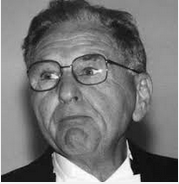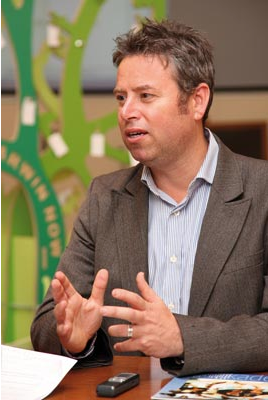This Page is still incomplete and under construction
Thought-Shapers
On this page we identify people who in a very meaningful way inform our thinking and way of working. We call these people "Thought-Shapers." We will give a brief description of their work and reveal the publications that we have read. Some of these people we have met and worked with, others we only know from reading their books and articles or looking at their videos or attending a conference where they were a speaker. We may not always agree with their point of view, but they certainly have stimulated our own thought-process.
We offer short descriptions of the following Thought-Shapers:
Russel Ackoff, Aaron Antonovsky, Edward De Bono, Peter Checkland, Peter Drucker, Charles-Hampden-Turner and Fons Trompenaars, David Snowden, Robert Sternberg, Richard Strozzi-Heckler, Mark van Vught, and Frans de Waal.
Russel Ackoff (1919-2009) "An organization is as good as the product of its interactions."
Russel Ackoff
Russel Ackoff is one of the great thinkers on Systems Theory. He originally contributed in the field of Operations Research as co-author of the book "Introduction to operations research, in 1957. In 1972 he co-authored the book "On Purposeful Systems: An Interdisciplinary Analysis of Individual and Social Behavior as a System of Purposeful Events." His crystal clear explanations brought with humor and some cynicism never failed to convey the essential characteristics of systems theory and the implications for organizations, society and leadership. His statement that "an organization is as good as the product of its interactions," implies that leaders and leadership should be particularly focused on the interactions between people, their departments/functions and not just focused on the actions of their individual department. He was also clear on the notion that "improvement must be focused on what you want and not on what you don't want." Because elimination of what you don't want e.g. a defect, does not mean you get what you do want. His influence was not limited to the field of management, but he also co-authored an important book on education (Turning Learning Right Side Up: Putting education back on track) and on the society as a whole (Redesigning society). We recommend that you look up the numerous videos on youtube. We offer here a short 12 minute video that could have been a TED presentation.
Important lessons learned are that improvement must always start from the whole of a system, e.g, an organization as whole, as opposed to start from the parts e.g., an department. From a societal point of view, discussing health care without looking at farm policies and subsidies is dysfunctional. And improvement must be focused on what you want and be directed at the value not just for an organization but also for the society in which the organization is contained. Ackoff also made the point of dissolving problems versus solving problems.
Literature references:
Ackoff, R. & Rovin, S. Redesigning Society (Stanford Business Books) (Stanford Business Books, 2003).
Ackoff, R. L. The Art of Problem Solving: Accompanied by Ackoff’s Fables (Wiley, 1987).
Ackoff, R. L. Ackoff’s Best: On Management (John Wiley & Sons, 1999).
Ackoff, R. L. Re-Creating the Corporation: A Design of Organizations for the 21st Century (Oxford University Press, USA, 1999).
Ackoff, R. L., Magidson, J. & Addison, H. J. Idealized Design: How to Dissolve Tomorrow’s Crisis.Today (Wharton School Publishing, 2006).
Ackoff, R. L. & Greenberg, D. Turning Learning Right Side Up: Putting Education Back on Track (Wharton School Publishing, 2008).
Ackoff, R. L., Fred Emery. On Purposeful Systems: An Interdisciplinary Analysis of Individual and Social Behavior as a System of Purposeful Events (Aldine Transaction, 2005).
Aaron Antonovsky (1923-1994) Theory of Sense of Coherence (SOC)
Aaron Antonovsky
Aaron Antonovsky was a medical sociologist who during his academic research in Israel discovered that 29% of holocaust survivors who had responded to his research survey were living an emotional healthy life. He started to research what caused them to live emotionally healthy. Rather than looking for causes of disease, a so-called pathogenic approach, he took the opposite approach, by trying to unravel the causes for living healthy. This is called a salutogenic approach. His findings led to the Theory of Sense of Coherence (SOC) that suggests that people can overcome major stressors in life if they can:
- Comprehend the bigger picture and how it relates to their personal circumstances (comprehensibility).
- Manage and influence their personal situation and know how to do this (manageability).
- Find Meaningfulness and see a viable future for themselves despite the adverse circumstances they face. This then motivates them to move forward (meaningfulness).
One of the lessons learned is that in relationships being able to understand, knowing what to manage and discovering why something or an event is meaningful for all involved will contribute to resilience of individuals and the relationship. In leadership one of the tasks of leaders is to help followers with sense-making and to facilitate a process of discovery and exploration so that those involved will discover why things are happening, what they can influence and how this may be meaningful for them.
Literature references:
Antonovsky, A. Health, Stress and Coping (The Jossey-Bass Social and Behavioral Science Series) (Jossey-Bass Inc Pub, 1979).
Antonovsky, A. Unraveling the Mystery of Health: How People Manage Stress and Stay Well (Jossey Bass Social and Behavioral Science Series) (Jossey-Bass, 1987).
David Snowden (1954) The Cynefin Framework
Dave Snowden
Dave Snowden is the founder and Chief Scientific Officer of the Cognitive-Edge network that focuses on "building methods, tools and capability to utilise insights from Complex Adaptive Systems theory and other scientific disciplines in social systems." We are a member of the Cognitive-Edge network and have attended courses and are certified for using the approach and the Cynefin framework. The Cynefin framework makes a distinction between ordered and unordered domains and shows us that in ordered environments very structured approaches like analysis, cause-and- effect based tools may help us to influence the environment effectively. But in unordered environments those same tools that are effective in structured environments may do more harm than good. For complex environments we need different approaches such as safe-to-fail experiments and explorative tools that work with both individual and collective intelligence.
One of the lessons learned is that relationships are almost always inherently complex and therefore people and those who lead must have the repertoire to work with an emergent approach and use skills to step into interactions where all involved can contribute ideas. The Cynefin framework teaches us that context matters and that being able to recognize context and how it changes is essential to be able to choose effective responses in those contexts. We recommend the Youtube channel of Cognitive-Edge and the following video about the Cynefin framework:
Literature references:
We recommend the Harvard Business Review article: Snowden, D. J. & Boone, M. T. A Leader’s framework for Decision Making. Harvard Business Review November, 69-76 (2007).
Mark van Vugt (1967) On how and why leadership evolved in the human species.
Mark van Vugt
Mark van Vugt is a professor of group and organizational psychology at the Free University of Amsterdam and has written an intriguing book "Naturally Selected, The evolutionary science of leadership," together with co-author Anjana Ahuja. HIs interest is in "developing and integrating evolutionary and social psychology theories to understand various group and organizational processes, in particular, leadership, status, power, altruism, cooperation, conflict, group cohesion, group decision-making, and intergroup relations." In their book the authors travel back some 2 million years to go back to identify some of the basic evolutionary principles that in their view still drive our behavior, choices and preferences today. And that includes how we behave in companies as leaders and followers. The tendencies to choose handsome tall powerful men and to exclude women from leadership positions, to follow people with charisma because we equate this with competency, to look suspiciously and competitively at people who are different then us (e.g. sales vs operations) can be explained from an evolutionary perspective. The authors also conclude that while once these tendencies were perhaps logical given the circumstances of living in tribes, today they are no longer rational. And that poses an interesting challenge: How do we override our natural tendencies and assert ourselves as followers and leaders in a different way? How can we use the tendencies in a good way and bring out the best in each other.
The lesson learned is that our evolution matters. The lens of evolutionary psychology is a valuable one. While it must not be overrated, the awareness of who we are as a species and how we evolved over time provides an important perspective when we want to design organizations that bring out the best in us.
Literature reference:
Vugt, M. V. & Ahuja, A. Naturally Selected: The Evolutionary Science of Leadership (Harper Collins, 2011)
We also recommend the youtube presentation by Mark van Vugt;
Frans de Waal (1948) Morality, empathy, pro-social and fairness can be found in animals and humans
Frans de Waal
Frans de Waal is a world renowned primatologist and biologist and professor at Emory university in the psychology department. He is well known for his work on the behavior and social intelligence of primates. His research shows that consolation behavior, showing empathy, competitiveness, fairness are traits that can be found in animals and also in humans. His initial research showed that monkeys were aggressive and were competitive. But then he also noticed their reconciliation behavior and cooperation. We enjoyed reading his publications, particularly Chimpanzee politics, The age of empathy and Primates and Philosophers. They are insightful, funny and thought-provoking. Based on thorough scientific research he argues that animals like Bonobos, Chimpanzees, and capuchin monkeys like humans are empathetic, show pro-social behavior like support, respond to unfair rewards and therefore have a sense of fairness. In Primates and Philosophers, De Waal writes on Page 189:
"To neglect the common ground with other primates, and to deny the evolutionary roots of human morality, would be like arriving at the top of a tower to declare that the rest of the building is irrelevant, that the precious concept of “tower” ought to be reserved for its summit. While making for good academic fights, semantics are mostly a waste of time. Are animals moral? Let us simply conclude that they occupy several floors of the tower of morality."
A lesson learned is that we humans come pre-programmed with tendencies that are good and bad. The key question that presents itself then is what do we do when we have to collaborate to achieve a common purpose to bring out the best rather than bringing out the bad. De Waal clearly shows that in addition to being able to harm and be bad, we humans also come with many positive tendencies including morality. How we activate these good tendencies is a matter of how we lead ourselves and others and how we design our organizations and the systems and procedures. Below is a short segment from his TED presentation on the effect of unfair rewards. Ask yourself: How fair are reward systems in our organizations?
References:
Waal, F. D. Our Inner Ape: A Leading Primatologist Explains Why We Are Who We Are (Riverhead Trade, 2006).
Waal, F. d. Primates and Philosophers: How Morality Evolved (Princeton Science Library) (Princeton University Press, 2009).
Waal, F. d. The Age of Empathy: Nature’s Lessons for a Kinder Society (Three Rivers Press, 2010).
Waal, F. d. Chimpanzee Politics: Power and Sex among Apes (The Johns Hopkins University Press, 2007).
We also recommend Frans de Waal's TED talk .









